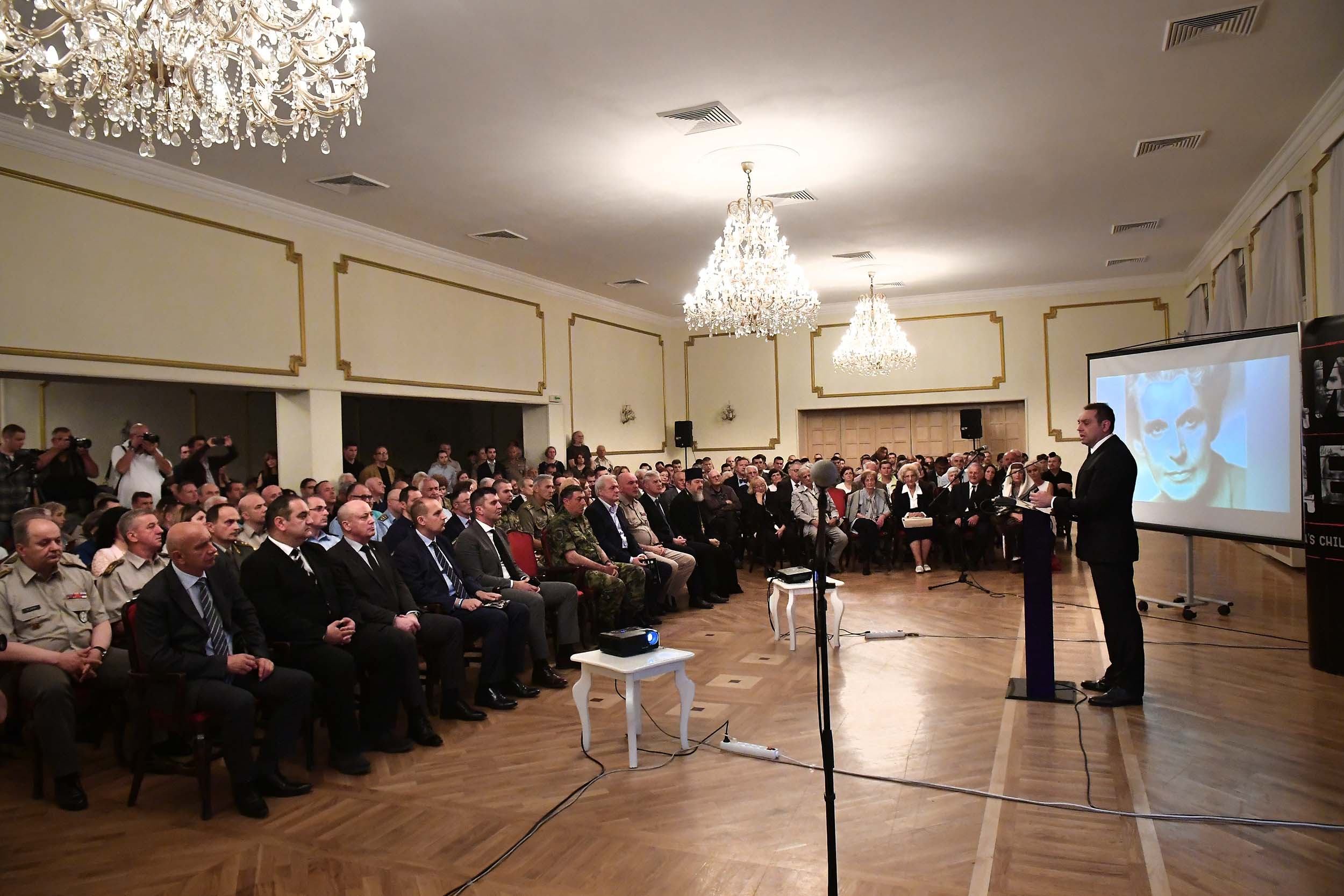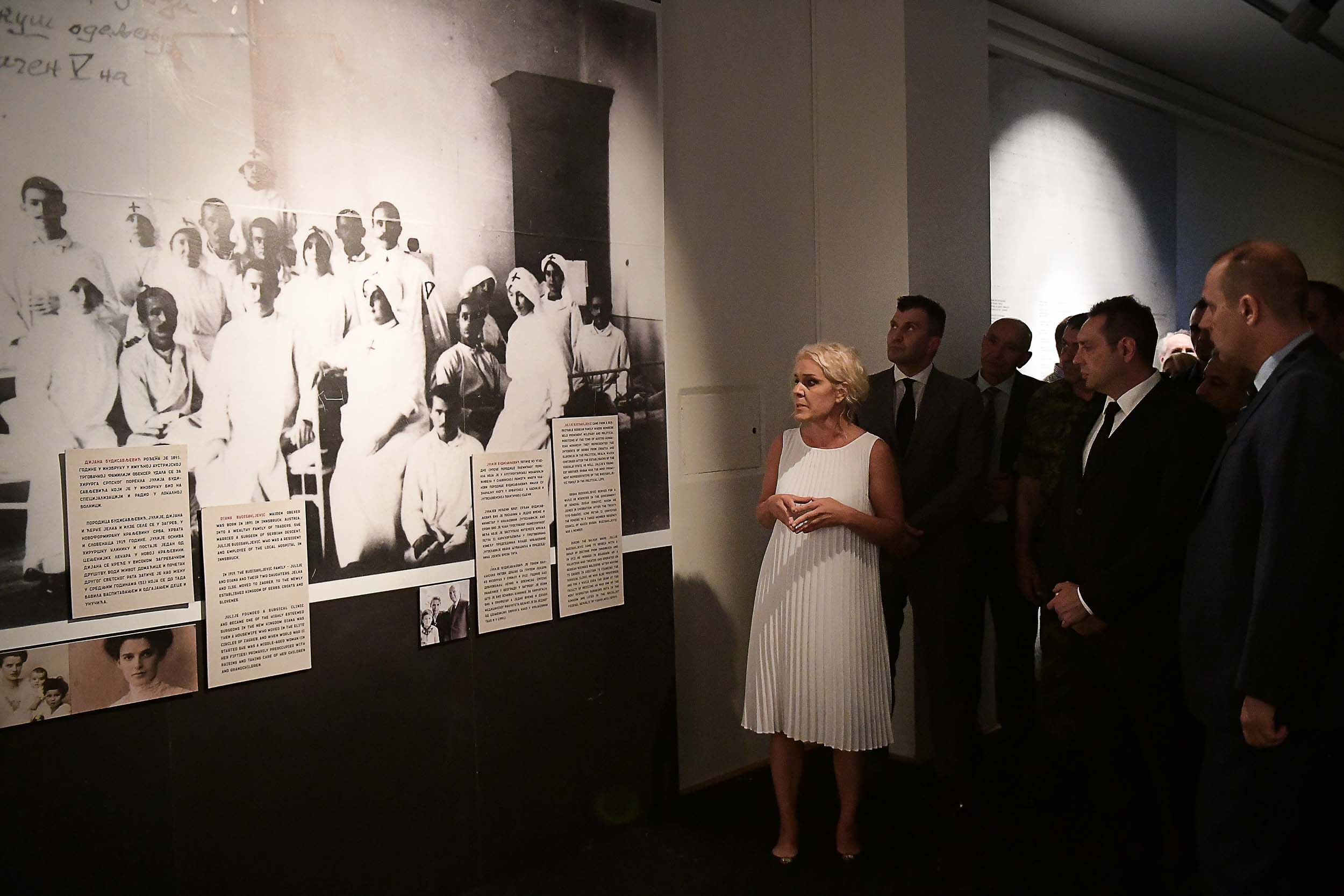15.05.2018.
Minister Vulin: The Road to Reconciliation is the Path of Dijana Budisavljebić, Not the Path of Bleiberg and Stepinac
- If we seek a road to reconciliation, than it is the path of Dijana Budisavljević, not the path of Bleiberg or Ustasha vicar Alojzije Stepinas – said Minister of Defence Aleksandar Vulin opening the exhibition “Dijana’s Children” tonight in the Central Military Club.
Minister Vulin also added that everybody would be wounded that evening, wounded by hatred and wounded by evil since it was difficult to understand the people who wanted to proclaim vicar of ustasha armed forces Alojzije Stepinac the saint instead of Dijana Budisavljević, a woman who had saved 7500 boys and girls from ustasha knife.
 - It is hard to understand that they recommend to the God the soul of a vicar of ustasha armed forces while no one asked for a halo for Dijana Budisavljević. No one spoke about Dijana Budisavljević for 70 years, so that the vicars of ustasha armed forces could as for their place in heaven. If they had spoken about her, then the vicars of ustasha armed forces would not have been allowed to speak and their peace of the light would not have been requested – Minister Vulin stressed.
- It is hard to understand that they recommend to the God the soul of a vicar of ustasha armed forces while no one asked for a halo for Dijana Budisavljević. No one spoke about Dijana Budisavljević for 70 years, so that the vicars of ustasha armed forces could as for their place in heaven. If they had spoken about her, then the vicars of ustasha armed forces would not have been allowed to speak and their peace of the light would not have been requested – Minister Vulin stressed.According to him, there is no a Serbian man and no man at all who would not in front of her picture gratefully bowed his head, light a candle filled with a feeling that there are people who are greater than evil.
- Tonight we speak on behalf of Dijana’s children, on behalf of 7,500 boys and girls, who were reborn and who gave birth to someone else. I speak this evening about those who gave birth to someone owing to Dijana, and we speak tonight about 20,000 killed boys and girls, and this evening we ask for a place in heavens for 20,000 slaughtered boys and girls and this evening we are trying to repay our debt to Dijana Budisavljević and tonight we are asking for heaven for her – Minister Vulin said.
Addressing the gathered, Minister Vulin particularly thanked for the presence of the survived camp inmates among whom there were some of “Dijana’s Children”, pointing out that they were “live monuments, the monuments of a nation that decided not to die despite the hatred”.
 - It has only been 73 years since the end of the Second World War, the most dreadful moral fall of human civilisation, and we have started forgetting the evil that created Auschwitz and Mathausen and Jadovno and Jasenovac. As early as 73 years afterwards, as time has passed and as the memory of the horrible terror has started to fade, what happened in Jasenovac has started to be forgotten, so that the number of victims started to decrease, belittled, mocked, but somehow, the number of killed children has always been the same at all sides and all the pages. By some strange providence, 20 thousand killed boys and girls have always been mentioned in the same fashion, 20 thousand souls that were just born, who never got to grow up, 20 thousand boys and girls killed by knife, wire, starving, bullet, fire, force, hatred. Twenty thousand boys and girls, an entire small town in which every citizen is a child, a child that never got to grow up, killed with pleasure, with the blessing, 20 thousand boys and girls were in the evil of Jasenovac – stressed Minister Vulin.
- It has only been 73 years since the end of the Second World War, the most dreadful moral fall of human civilisation, and we have started forgetting the evil that created Auschwitz and Mathausen and Jadovno and Jasenovac. As early as 73 years afterwards, as time has passed and as the memory of the horrible terror has started to fade, what happened in Jasenovac has started to be forgotten, so that the number of victims started to decrease, belittled, mocked, but somehow, the number of killed children has always been the same at all sides and all the pages. By some strange providence, 20 thousand killed boys and girls have always been mentioned in the same fashion, 20 thousand souls that were just born, who never got to grow up, 20 thousand boys and girls killed by knife, wire, starving, bullet, fire, force, hatred. Twenty thousand boys and girls, an entire small town in which every citizen is a child, a child that never got to grow up, killed with pleasure, with the blessing, 20 thousand boys and girls were in the evil of Jasenovac – stressed Minister Vulin.According to him, that evening they talked about the children of Jasenovac, Kozara and everybody would be wounded by incredible force of evil and ashamed by incredible goodness of a woman about whom we know so very little.
- Tonight we will look, one more time, into deep, way too deep, to early matured eyes of the children from Kozara and Jasenovac, children who saw their fathers, mothers, brothers and sisters dying in horrible torments. We will once again look into too deep and too early matured eyes of the children from Kozara and Jasenovac, who will forever, until the last day of Earth, until the last breath on the Earth be recognized by the horror in their eyes, the horror that never disappears, and how could it disappear? And do not be afraid, and do not wonder when on the photographs of the children killed long time ago you recognize the colour of the eyes, laughter, features of the face of your children, our children, because all the children killed in Jasenovac are our children and they are all repeated in the children of the people sentenced to extermination, but of the people who refused to die. Do not be afraid when you recognise their smile and eyes, because the children from Jasenovac are our children, all our children – emphasised Minister Vulin.
The author of the exhibition Slađana Zarić, who is also the author of a documentary film of the same title a segment of which was presented this evening to the gathered, spoke about the importance of the exhibition and the entire project.
 - Together with the Ministry of Defence and RTS, I decided that we should make a project but not to make it just a documentary film, but that we should make an exhibition as well, because we wanted to introduce Dijana Budisavljević to every home, every pupil’s desk, and to talk more about Dijana. The story of Dijana Budisavljević is at the same time a story about the people who managed in the most difficult times to remain human, who were something that is sometimes the most difficult – to be a human - Slađana Zarić stressed adding that by this project she had wanted to personalise a story of the killed in Jasenovac and the story of their fates and to talk about more than just the numbers.
- Together with the Ministry of Defence and RTS, I decided that we should make a project but not to make it just a documentary film, but that we should make an exhibition as well, because we wanted to introduce Dijana Budisavljević to every home, every pupil’s desk, and to talk more about Dijana. The story of Dijana Budisavljević is at the same time a story about the people who managed in the most difficult times to remain human, who were something that is sometimes the most difficult – to be a human - Slađana Zarić stressed adding that by this project she had wanted to personalise a story of the killed in Jasenovac and the story of their fates and to talk about more than just the numbers.The exhibition of the author Slađana Zarić and the author of the architecture Ivan Mangov is dedicated to the greatest rescue mission of the children from concentration camps during the Second World War. Owing to Dijana Budisavljević, more than 7,500 Serbian boys and girls were saved from certain death in the concentration camp Jasenovac in the Independent State of Croatia.
The opening of the exhibition was attended by representatives of the National Assembly, ministers in the Serbian Government, Chief of General Staff of the Serbian Armed Forces General Ljubiša Diković, representatives of diplomatic corps, Serbian Orthodox Church, Jewish and Romani associations, the Ministry of Defence and Serbian Armed Forces and numerous citizens.




